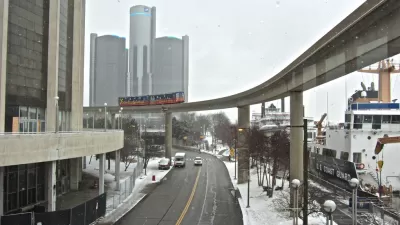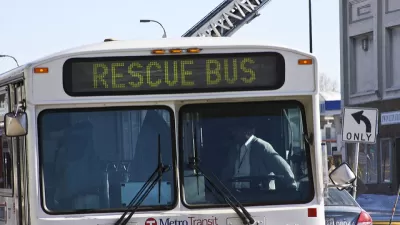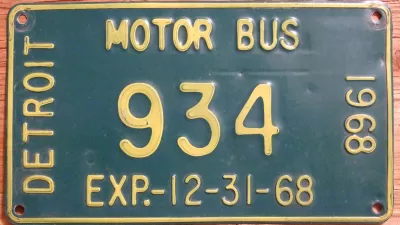Voters in the Detroit region had a chance to reverse 40 years of neglect for regional transit. Instead, they kicked the can down the road.
"So many breaks have gone Detroit's way the past few years that we were bound to lose a big one sooner or later," begins an article by John Gallagher. He continues without leaving the reader in suspense:
That loss came Tuesday when voters rejected the Regional Transit Authority millage proposal. Tax-adverse residents in Macomb County shot it down in such numbers that they overcame a break-even vote in Oakland and approval of the measure in Wayne and Washtenaw counties. The total vote was what counted.
With the vote, the region "lost its best hope in decades to build a unified and efficient public transportation system in the four-county area," writes Gallagher.
As noted in an article by Angie Schmitt in October, regional transportation has always been a tough sell in the traditional home of the American auto manufacturers. It took 40 years and 23 attempts to establish the Regional Transit Authority of Southeast Michigan in 2012. Even Tuesday's referendum had to come back from the dead once to make it to the ballot.
According to Gallagher, the failure of voters to approve the regional transit plan earlier this week strikes a symbolic blow to Detroit's revitalization. That revitalization, however, has focused in the area of downtown, where distances are walkable and transit options are relatively rich. Meanwhile, people like James Robertson are forced to walk 21 miles on his commute between his home in Detroit and his job in Rochester Hills.
FULL STORY: After string of good news for Detroit, RTA loss stings

Alabama: Trump Terminates Settlements for Black Communities Harmed By Raw Sewage
Trump deemed the landmark civil rights agreement “illegal DEI and environmental justice policy.”

Planetizen Federal Action Tracker
A weekly monitor of how Trump’s orders and actions are impacting planners and planning in America.

How Atlanta Built 7,000 Housing Units in 3 Years
The city’s comprehensive, neighborhood-focused housing strategy focuses on identifying properties and land that can be repurposed for housing and encouraging development in underserved neighborhoods.

In Both Crashes and Crime, Public Transportation is Far Safer than Driving
Contrary to popular assumptions, public transportation has far lower crash and crime rates than automobile travel. For safer communities, improve and encourage transit travel.

Report: Zoning Reforms Should Complement Nashville’s Ambitious Transit Plan
Without reform, restrictive zoning codes will limit the impact of the city’s planned transit expansion and could exclude some of the residents who depend on transit the most.

Judge Orders Release of Frozen IRA, IIJA Funding
The decision is a victory for environmental groups who charged that freezing funds for critical infrastructure and disaster response programs caused “real and irreparable harm” to communities.
Urban Design for Planners 1: Software Tools
This six-course series explores essential urban design concepts using open source software and equips planners with the tools they need to participate fully in the urban design process.
Planning for Universal Design
Learn the tools for implementing Universal Design in planning regulations.
Caltrans
Smith Gee Studio
Institute for Housing and Urban Development Studies (IHS)
City of Grandview
Harvard GSD Executive Education
Toledo-Lucas County Plan Commissions
Salt Lake City
NYU Wagner Graduate School of Public Service





























